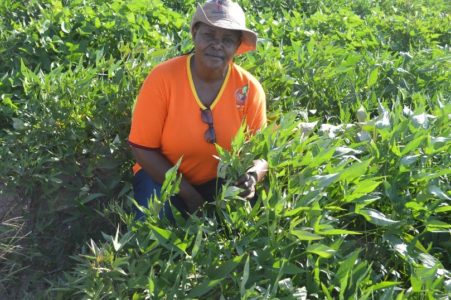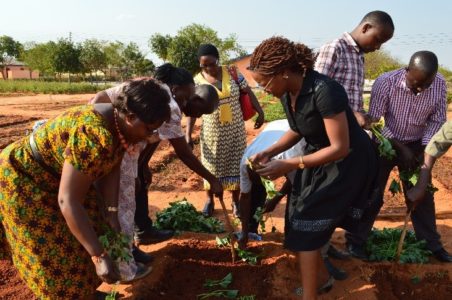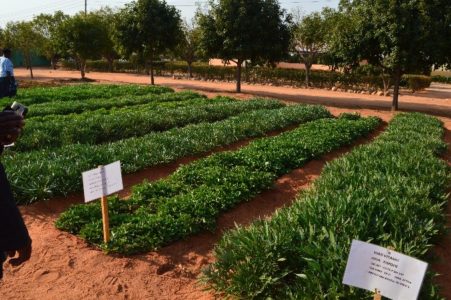
Tanzania’s Dr. Kiddo Mtunda is championing groundbreaking efforts in her country to ensure that the pro Vitamin A-rich orange-fleshed sweetpotato (OFSP) becomes the new wonder crop for fighting micronutrient malnutrition and more so Vitamin A deficiency (VAD). This problem affects women of reproductive age, infants and young children, many of who suffer multiple deficiencies of essential micronutrients such as vitamin A, iron and zinc, which can result in an array of health problems or even early death. Most of the people affected by malnutrition do not show the physical symptoms usually associated with hunger and malnourishment hence the term ‘hidden hunger’.
A Borlaug LEAP Alumnus and an experienced plant breeder; Dr. Mtunda is the Officer in-charge at the Sugarcane Research Institute in Kibaha (SRI-Kibaha). She is championing Tanzania’s commendable progress in finding a sustainable nutrition-sensitive solution to address hidden hunger. Statistics in the 2014 Global nutrition report put the overall magnitude of vitamin A deficiency (VAD) in Tanzania at 33% mostly affecting preschool age children. This is why she is moving with speed to find solutions through her breeding work which focuses on root crops mainly OFSP and cassava.
SRI-Kibaha through the leadership of Dr. Mtunda has collaborated with the International Potato Center (CIP) to scale up OFSP through breeding new varieties; strengthening seed systems and capacity development efforts in Tanzania. Such projects with CIP include the Building Nutritious Food Baskets (BNFB), Reaching Agents of Change (RAC), Sweetpotato Action for Security and Health in Africa (SASHA) and Viable Sweetpotato Technologies in Africa (VISTA).
An ardent OFSP breeder, Dr. Mtunda together with colleagues in Tanzania have released 17 sweetpotato varieties out of which, six are OFSP and another three are in the pipeline for release. These varieties are high yielding, drought tolerant and adaptable to different agroecological zones of Tanzania. In addition to her contribution to breeding and capacity development, she continues to promote and raise awareness on the nutritional benefits of consuming OFSP among various target groups. This includes to the next generation of leaders (the youth) in primary schools, teachers and women in the communities in general.

Photo Credit: N. Luambana (SRI-Kibaha)
SRI-Kibaha is a good example of the impact and sustainability of the RAC project’s capacity development efforts. Between 2011 and 2014, CIP and Helen Keller International (HKI) implemented the RAC project, which among other objectives, built the capacity of institutions to scale-up the production and consumption of OFSP to combat vitamin A deficiency among young children and women of reproductive age. In Tanzania, RAC strengthened the capacity of national partners like SRI-Kibaha to self-organize, drive their own agenda, take ownership, and pass down the skills acquired to the end-user – the farmer. Consequently, SRI-Kibaha continues to develop capacity of other national institutions, individuals and communities to create a critical mass producing and consuming OFSP.

Photo Credit: J. Maru (CIP-SSA)
Dr. Kiddo explains that although the breeding process and the release of varieties takes about six to seven years and requires a lot of effort, collaborating with partners has ensured millions of people in Tanzania access the nutritious vitamin-A rich OFSP. Delivering a keynote speech at the 2017 Sweetpotato for Profit and Health Initiative (SPHI) conference that was held in Dar e salaam Tanzania in September 2017; Dr. Mtunda highlighted the tremendous progress made so far by the Tanzania National Agriculture Research Systems (NARs) in sweetpotato breeding and seed systems. She further remarked that Tanzania is accelerating these efforts to ensure that breeders come up with high yielding varieties (with root yields of over 15 tons per hectare), early maturity (of four months or less after planting), tolerance to viral diseases (at a score of 2 on a 1-5 scale), high beta-carotene content of roots and leaves, leaves with high iron and zinc content, sugar content (low, moderate, high), dry matter of 20%-38% as well as multiple purpose sweetpotato (fodder/leaf and root production). She further pointed out that out the SPHI’s target of reaching 20million households with OFSP, at least 5 million will be in Tanzania through efforts of national and other partners.
‘I’m passionate about championing the scaling up efforts for OFSP in Tanzania. The contribution of OFSP in ending hidden hunger in Tanzania is highly gratifying. I will continue to develop the capacity of other women to champion and advance the agenda of reducing vitamin A deficiency through the production and consumption of OFSP within their spheres of influence”, Dr. Mtunda says.
Story by Joyce Maru
Capacity Development and Communication Specialist (BNFB)
